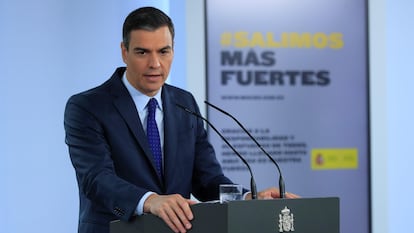Prime minister calls for ‘patriotism’ from opposition as Spain rebuilds in wake of coronavirus
In a televised address today, Pedro Sánchez appealed for ‘unity’ among political parties ‘to achieve reconstruction’

Spanish Prime Minister Pedro Sánchez stepped up the pressure today on the main opposition Popular Party (PP) to change its strategy and support the government in the wake of the devastating coronavirus crisis, and back its plans for economic reconstruction.
Speaking during a televised address on Sunday, the Socialist Party (PSOE) leader launched veiled criticism of the PP, without mentioning the party by name, after it emerged last week that its European branch was among the parties that are calling for strict controls on the reconstruction funds that the EU will release to help countries such as Spain and Italy that have been particularly hard hit by the coronavirus pandemic. These groups want to allow southern European countries less room for maneuver in terms of decision-making once these funds are released.
No one should consider gaining an advantage from damaging the interests of Spain and SpaniardsPM Sánchez
Sánchez called on the PP to support the Spanish and Italian governments’ strategy, so that the fund is established without such conditions. He also appealed for “patriotism,” a term that he does not usually employ. “No one should consider gaining an advantage from damaging the interests of Spain and Spaniards,” he said on Sunday. “I’m calling on all Spanish parties to actively support the proposal from the European Commission. If Spain wins, we all win. If Spain loses, not only does the government lose, we all lose. I’m calling for responsibility, a big vision and patriotism.”
Sánchez leads a coalition government with junior partner Unidos Podemos, and lacks a working majority in the Congress of Deputies. As such he needs the support of other groups in the lower house of parliament to pass legislation, and is currently seeking backing from the PP to pass the decree setting out the regulations of the “new normality” – i.e. the conditions under which Spanish residents will have to live until the government declares the coronavirus crisis to be over.
The prime minister also announced major plans for the automotive sector in Spain, with €3.75 billion of assistance “in its transition toward sustainable mobility,” and for tourism, with Schengen area borders opening earlier than expected, on June 21. He is hoping to find broad political support for these measures, as was the case with the new guaranteed minimum income scheme, which was passed by Congress last week without any votes against.
“I’m calling for unity among the political parties who are evaluating the measures in the reconstruction plan,” he said. “I’m calling for unity among the regional premiers, we will hold a meeting in person at the end of July, after the Basque and Galician elections. We can make alliances, between companies and workers, between all of the political forces, to achieve the reconstruction of Spain.”
Since Sánchez came to power in June 2018, he has been unable to pass a new budget through Congress
Parliament is, he said, “very fragmented. Citizens are calling on us to do deals. There are demands for this, no matter how people vote.” And with “an unprecedented halt in activity,” he continued, “we have to get the country moving. And as such, all of us have to do our part. Unity is a lifejacket. If it was ever justified for all of us to do our bit, it is in these circumstances. It would be great news if we could have a budget that is tailored to the situation that we are going through,” he said.
Since Sánchez came to power in June 2018, he has been unable to pass a new budget through Congress, meaning that Spain is still operating under the financial blueprint set out by the previous PP government of Prime Minister Mariano Rajoy.
Sánchez said today that he supported a congressional commission with all parties to analyze the errors that were made during the coronavirus crisis in Spain, so that they will not be repeated. And he admitted that there were problems during the first weeks of the epidemic with the supply of personal protective equipment. “A second wave is possible,” he said of the virus. “But we must avoid it because it would put us up against the wall. That’s why we must learn from everything that we have gone through in order to be better prepared. The virus has not disappeared.”
English version by Simon Hunter.
Tu suscripción se está usando en otro dispositivo
¿Quieres añadir otro usuario a tu suscripción?
Si continúas leyendo en este dispositivo, no se podrá leer en el otro.
FlechaTu suscripción se está usando en otro dispositivo y solo puedes acceder a EL PAÍS desde un dispositivo a la vez.
Si quieres compartir tu cuenta, cambia tu suscripción a la modalidad Premium, así podrás añadir otro usuario. Cada uno accederá con su propia cuenta de email, lo que os permitirá personalizar vuestra experiencia en EL PAÍS.
¿Tienes una suscripción de empresa? Accede aquí para contratar más cuentas.
En el caso de no saber quién está usando tu cuenta, te recomendamos cambiar tu contraseña aquí.
Si decides continuar compartiendo tu cuenta, este mensaje se mostrará en tu dispositivo y en el de la otra persona que está usando tu cuenta de forma indefinida, afectando a tu experiencia de lectura. Puedes consultar aquí los términos y condiciones de la suscripción digital.









































